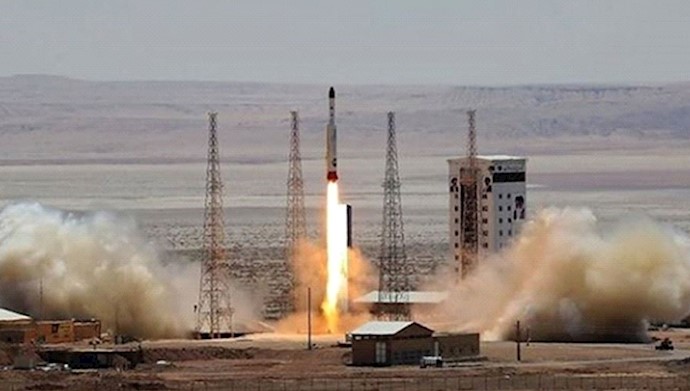Analysis by PMOI/MEK
Jan. 21, 2019 – While Iran’s economy is on a downward spiral, many construction projects are shut down, and the budget for ministries like education, transportation and healthcare have decreased year after year, the ruling mullahs in Tehran continue to increase the budget for their security forces and missile test projects.
Testing missiles and sending satellites into the Earth’s orbit while unemployment is ramping up in Iran are meant to help the regime to cover its own weakness in the balance of power on the world stage and boost up the morale of its increasingly disillusioned base in Iran itself.
In a speech in Golestan province on January 14, Iranian regime president Hassan Rouhani praised the benefits of having a satellite and said: “The Payam satellite will be soon launched into orbit with a shuttle made in [Iran] and will be place at distance of 600 kilometer from earth. Both the satellite and the satellite carrier are built by academics of our country especially the Amir Kabir University. The satellite will pass over us six times a day. With its cameras, Payam [satellite] will send us information about the weather, agriculture, water and vegetation. This is not a research satellite but our first operational satellite.”
But the satellite that was meant to boost the morale of the Islamic Republic’s diminishing base, didn’t pass over them even once. It exploded before entering the orbit.
And while the ruling elite and connected few live in luxury and pursue expensive and failed projects, the Iranian people are drowning in a mismanaged economy that doesn’t provide for equal opportunities.
On January 17, Mardom Salari newspaper wrote: “The economic crisis and people’s difficulties to make ends meet have left the society with no motivation to pursue such issues. After four decades of facing a variety of difficulties and trial and error, it is necessary to reach a unity about how we handle development.”
Mardom Salari’s writer didn’t dare to say that the Iranian people outright hate such projects because they come at the cost of the bread at their tables.
In an article on January 17, Iran newspaper, the mouthpiece of Hassan Rouhani’s government, quoted Sadegh Zibakalam, an Iranian economist close to Rouhani’s faction, saying: “I wish, instead of the nuclear industry, instead of satellite and missiles, the Islamic Republic could build a bicycle that could compete with Turkey’s bicycles or India’s bicycles. When the people from every class don’t write songs and don’t create music for something spontaneously and [instead] ask questions that our strategists and analysts don’t like, then the problem is beyond not understanding or being under the influence of aliens. There is something in the economic-political regime that prevents the social and cultural connection between the people and technology.”
In the current suppressive political climate of Iran, one couldn’t describe the problem more articulately without fearing severe repercussions.
What Zibakalam describes, while still covering the real culprits of the Iranian situation, is a growing rift between the political elite and ordinary Iranians.
As the people of Iran have made clear in the slogans they chant in their protests, they’re not looking within the regime’s factions to bring an end to four decades of catastrophic nightmare and the establishment of the rule of law, democracy, and prosperity to Iran. That’s something that the people themselves and their organized resistance movement will accomplish.





